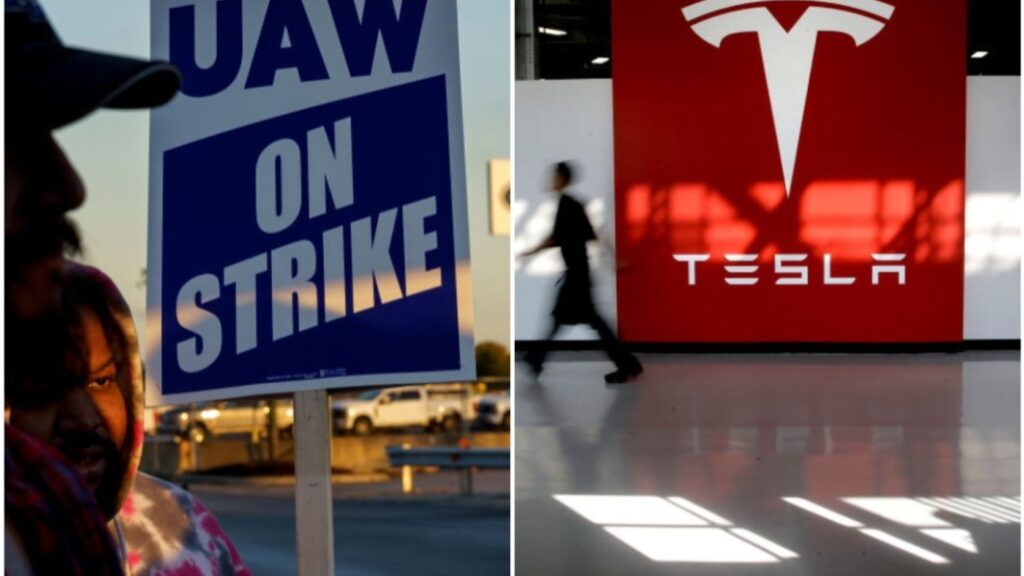Why the Detroit 3 might actually support unionization at Toyota, Honda and Tesla

The
UAW has said its set its sights on
Tesla.
Michael Swensen/Getty Images and Michael Macor/The San Francisco Chronicle via Getty Images
The UAW has big aspirations for unionizing the auto industry outside of Detroit.
Ford, GM, and Stellantis would “love to see the UAW level the playing field.”
The new contracts with the UAW are likely to widen an already large labor cost gap.
The United Auto Workers union is heading out of a historic strike at all three Detroit car companies with a bit more swagger, and with big aspirations for unionizing other corners of the automotive industry.
When presenting the first tentative agreement to Ford members over the weekend, UAW President Shawn Fain said the wins the union made during their “Stand Up” strike can reverberate across the industry.
“When we return to the bargaining table in 2028, it won’t just be with the Big Three,” Fain said, “but with the Big Five or Big Six.”
Now, with more expensive contracts in hand with the UAW, executives at the Detroit Three might actually be rooting for the union to organize at its competitors. The companies always go into quadrennial talks with the UAW looking to keep their labor costs “competitive” with their non-union counterparts, which spend less per hour on wages and benefits for their factory employees.
While there has always been a gap between Detroit’s labor costs and that of Toyota or Tesla, the chasm is widening significantly under the new tentative agreements at Ford, GM, and Stellantis – a worrying sign for the EV transition as these companies are already struggling to compete on price and affordability.
“They’d love to see the UAW level the playing field,” Art Wheaton, a labor expert at Cornell University, told Insider. “Especially at Tesla for this electric vehicle transition.”
Where the UAW can organize next
The UAW’s most ripe targets heading into 2024 are likely smaller foreign car companies like Kia, Hyundai, and Volkswagen, Wheaton said. The union in 2019 came very close to organizing a Volkswagen factory in Chattanooga, Tennessee, but their drive was badly hobbled by controversy surrounding a growing criminal investigation into union leaders.
Fain is the first UAW president elected after the government completed its investigation and installed a federal monitor to oversee a more democratic presidential election. And he is intent on reminding his members and the rest of the public that he is representing a new-and-improved UAW.
“This is not your father’s, your mother’s, or your grandfather’s UAW,” Wheaton said. “The more they win at the table, the more they’re likely to win in these organizing drives.”
It’s likely that the UAW will also take another swipe at unionizing Elon Musk’s Tesla, which many in the industry have already crowned the winner of the 46-day strike at Ford, Stellantis, and GM. But the UAW will likely want to notch more wins before taking on Musk’s aggressive anti-union tactics.
More UAW shops won’t solve all of Detroit’s problems
More unionization across the automotive industry could level the playing field on labor costs, but Detroit is far behind its competitors – particularly Tesla – on more than just labor cost efficiencies, said Martin French, managing director at automotive consultancy Berylls.
“Leveling the playing field is a little bit more easily said than done,” French told Insider. “When it comes to EVs, Tesla’s advantages go way beyond union issues.”
French said beyond cheaper labor, Tesla also has innovated more efficiencies on its assembly lines, negotiated better deals on material costs, and found overall better ways of building electric cars than the Detroit rivals.
Ford and GM in particular are struggling to keep pace with Tesla in an increasingly unpredictable electric vehicle market. In recent weeks, both companies have signaled a retreat from previous EV production targets as customers are less willing to pay more for their vehicles.
“Without being too blunt,” French said, “I’d be worried about what’s going on in their own backyard much more than anybody else’s.”



